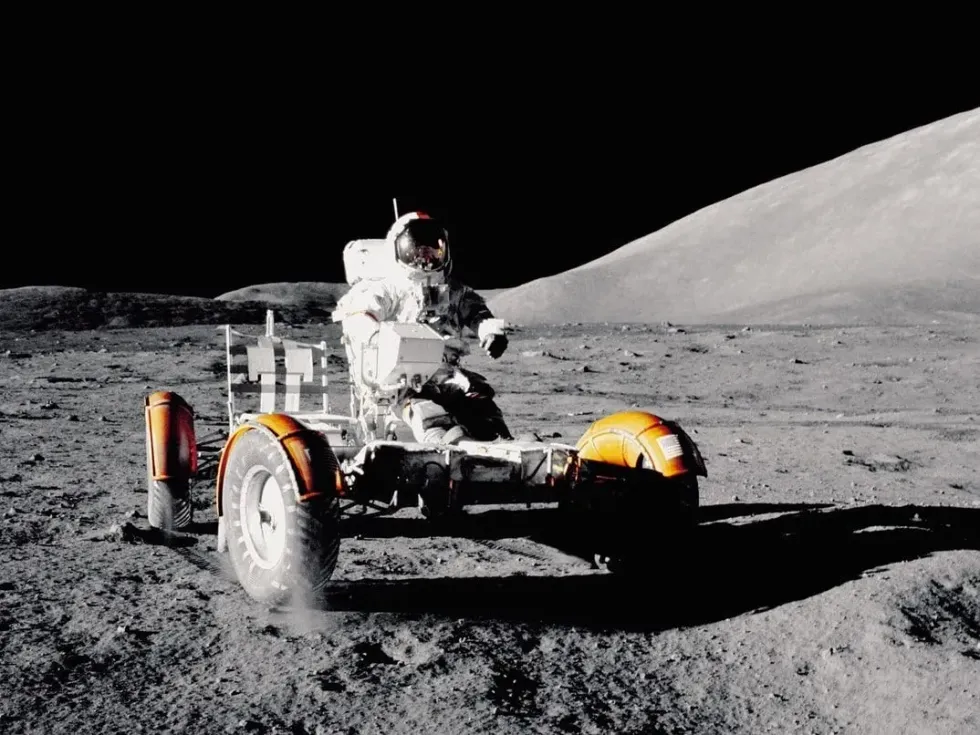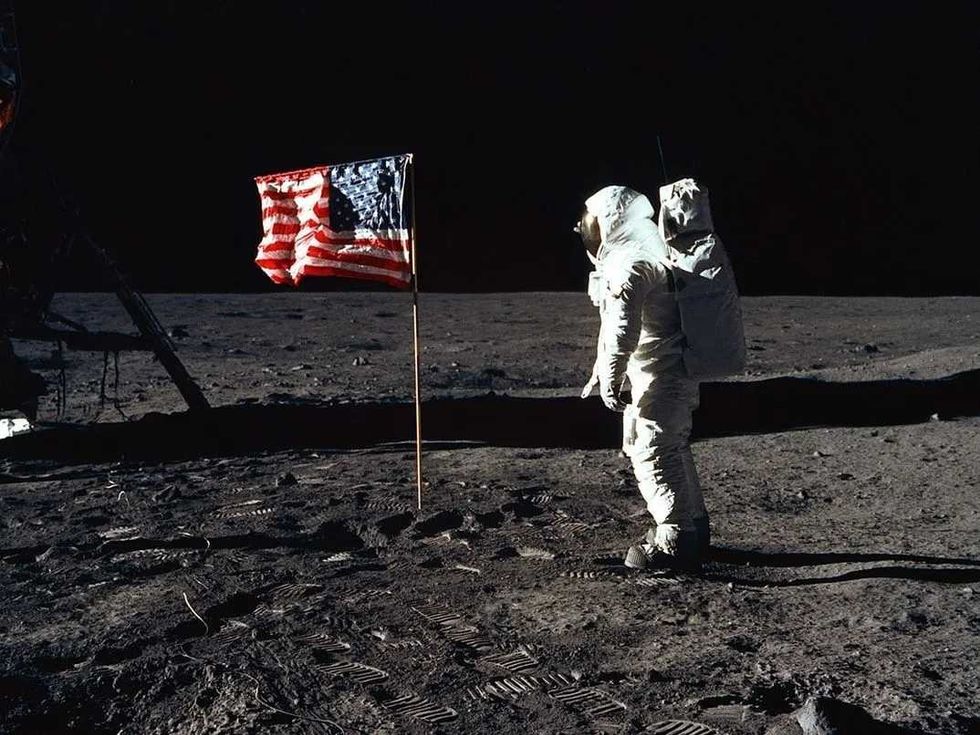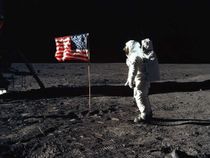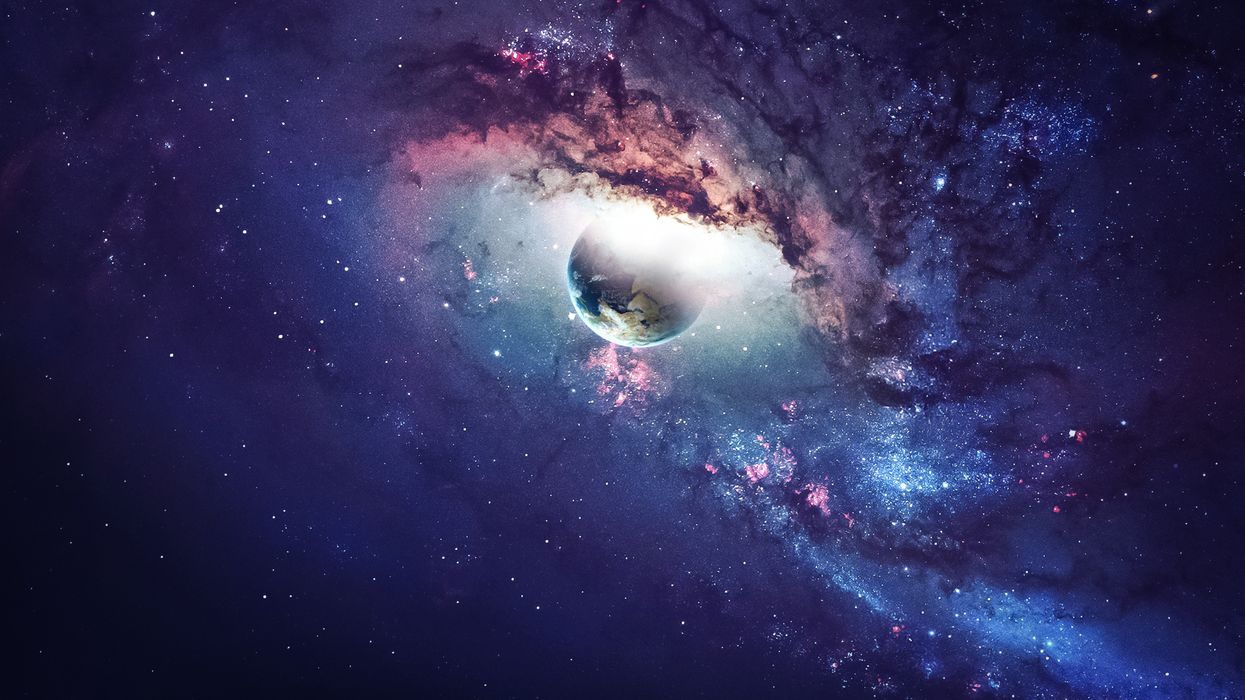1969 Moon Landing Facts: Reality Or Conspiracy, Let's Read!

On July 20, 1969, Space science took one giant leap, and Neil Armstrong stepped on the moon's surface.
Fifty years ago, on July 16, 1969, three astronauts, Neil Armstrong, Edwin Aldrin, and Michael Collins, boarded Apollo 11 Spacecraft to make this incredible event happen and step onto another world.
The very famous Neil Armstrong was the Mission Commander for this mission, Edwin Aldrin, who was also famously known as Buzz Aldrin, the lunar module pilot, and Michael Collins was the command module pilot for Apollo 11 Spacecraft.
The Kennedy Space Center, situated in Cape Kennedy, was from where the Apollo 11 spacecraft was launched. Kennedy Space Center was named after the great President John F. Kennedy, a great American politician who unfortunately was not alive when we landed on the moon.
He is the one who served as the 35th President of the United States of America.
It takes about three days to reach the moon and it took the same time for Apollo 11. The purpose to go to the moon was to know about early earth formations and explore whether water exists on the Moon.
The Apollo lunar landers on the moon are too small to see from even earth's largest telescopes like Hubble.
Neil Armstrong, who was the very first man on the Moon, created History, and the space technology of Earth took one giant leap. Buzz Aldrin joined Neil Armstrong nineteen minutes later and became the second man to walk on the Moon's surface.
The entire world watched with awe as the astronauts took their historic first step onto the Moon. It was the culmination of the Apollo 11 mission, begun in May of that year when the astronauts were launched into space in a rocket.
As the date of the lunar landing grew close, people around the world kept an eye with bated breath. Millions of people watched the astronauts land on the Moon on television.
If you love to read fun facts from different notable years, then why not check out 1974 Fun Facts and 1976 Fun Facts?
Development In Transportation: Space Technology
If you think the Apollo Mission was one of the biggest things to happen in NASA history, you're right. The United States and other countries like Russia, India, and China were interested in what was happening on the surface of the Moon.
Fun fact, the lunar surface smells a to like the gun powder. Everyone was glued to television sets, radios, and computers, listening to the live communication between the astronauts and the ground crew back at home.
NASA converted real-time scan to NTSV format to broadcast it. The moon landing was broadcast in the UK at 11:30 PM on 20th July.
Other than the famous ones, Pete Conrad, Alan Bean, Alan Shephard, Edgar Mitchell, David Scott, James Irwin, John Young, Charles Duke, Harrison Schmitt, and Eugene Cernan were Apollo astronauts who walked on the moon.
In fact, did you know that in total six crewed landings on the moon and many unmanned ones have been attempted at the moon? So how did NASA do it?
How did they send three men to the Moon, successfully land them on the surface, and then bring them back home again? Let's take a look at the pieces that made it possible.
In the year 1969, a lot of developments were happening in transportation and space technology. In fact, Neil Armstrong led the Apollo 11 mission to the Moon in a spacecraft named the Lunar Module, and Buzz Aldrin was the lunar module pilot.
Although it is unknown how long it took to build the rocket, the Lunar Module was a two-part spacecraft. After it got separated from the Command Module in lunar orbit, the Lunar Module got ready to land on the Moon.
The Command Module always stayed in orbit while the Lunar Module landed on the Moon. The Lunar Module had two stages.
In the first stage, it separated from the Command Module and orbited the Moon. In the second stage, it landed on the Moon. The Lunar Module was a crucial part of the Apollo program.
It carried astronauts from lunar orbit to the surface of the Moon. It also carried astronauts from the surface of the Moon back into lunar orbit.
The Lunar Module was a small spacecraft, but it was a crucial part of the Apollo program. We can reach earth via a Spacecraft like Apollo 11.
The first human-crewed space mission to land on the Moon was Apollo 11. It was also the first Moon landing in History.
It was a giant leap for humankind. Apollo 11 was a Saturn V rocket launched from Kennedy Space Center, Florida, on July 16, 1969.
The launch also included a Command/Service Module (CSM) named Columbia and a Lunar Module (LM) called Eagle. After a two-day journey, Apollo 11 entered lunar orbit on July 18.
On July 20, the LM separated from the CSM and landed on the Moon's surface. The astronauts, Commander Neil Armstrong and Edwin Aldrin, spent approximately two and a half hours on the surface while Michael Collins remained in lunar orbit.
After rejoining Collins in lunar orbit, the LM lifted off from the Moon to rejoin the CSM, and the astronauts returned to Earth on July 24. The first telephone call to the moon was made by President Nixon.
The space technology of 1969 was really good. The United States of America was the very first country that ever set foot on the Moon.
The transportation of the astronauts to the moon was made possible because of the technology they have in making a vehicle to transport people from one place to another in a faster way. The mission of Apollo 11 was to achieve a landing on the moon while the astronauts were in lunar orbit.
In order to do that, they needed to communicate with the earth and the spacecraft.
In fact, the first time that Neil Armstrong, the commander of the mission, stepped on the surface of the moon, his very first words were: "Houston, Tranquility Base here. The Eagle has landed."
A space museum that contains the remains of the Apollo 11 spacecraft has been set up at Moffett Field in California, the former space headquarters of NASA. The museum is equipped with a 3D tour of Apollo 11, the first spacecraft to land on the Moon.
An extensive collection of artifacts of the Apollo 11, including the command module, lunar module, and a lunar space suit, has been exhibited in the museum.
The Space Museum also contains the remains of the historic spacecraft.
The remains of the spacecraft were discolored after it was exposed to the extreme heat of re-entry into the earth's atmosphere. The museum also contains an interactive display of how the astronauts spent their time in space and a short documentary on the historic mission.
Development In Communications: Space Tech
1969 saw the first human-crewed mission to the moon from the command module's computer to the portable life support system. NASA used a wide variety of new technologies, and their success meant that the United States became the very first nation to send a human on the Moon.
Neil Armstrong, Michael Collins, and Buzz Aldrin were the astronauts who made this mission possible.
We have been on the Moon around 22 times with 24 astronauts of whom 12 walked on the Moon. December 1972, was the last time we went to the moon.
The year 1969 was exceptional, and it also saw the first-ever communication satellite named Telstar, which was launched into space by NASA. It was the first communication satellite to transmit live television across the Atlantic Ocean.
The satellite was also used to transmit fax, data, and telephone signals. The first communication satellite that was used to transmit television signals was the Early Bird satellite launched into space in 1965.
By 1969, communication satellites were already being used by television companies to transmit satellite television signals. Buzz Aldrin filmed the moon landing.
There were around 400,000 people from earth who worked to make the Apollo 11 mission happen right from the ascent stage to the descent stage. The Lunar mission also marked the first time that humans saw images of the far side of the Moon.
It was also the first time when humans had taken lunar samples from the landing site or lunar surface and brought them to planet earth. The samples of the lunar surface taken by Apollo 11 weighed around 49 lb (22 kg) and were around 1.97 billion years old.
The Apollo 11 mission pioneered the use the Apollo Lunar Module (Eagle).
Once the Lunar module lands, the descent stage rocket engine slows it and drops into the lower surface, and then helps in hovering over the lunar surface. The Eagle landed smoothly, which allowed Apollo 11 astronauts to land on the moon and to return to Earth safely.
It was also the first to use the Apollo Guidance Computer. NASA currently has plans to put humans on Mars by the 2030s.
The entire world was watching as the Apollo 11 crew prepared to land on the moon in the summer of 1969. The whole world excitedly watched as Neil Armstrong took that history-making first step.
The moment was a massive victory for the United States, not only because it was a significant step towards the "Space Race," but also because it was a moment of pride for our country. After all, we were able to show the world that the US was capable of doing anything, even going to the moon.
The problems with Apollo 11's communications began before the mission even launched. The Apollo 11 mission was the first where astronauts would be able to transmit live video back to earth while they orbited the moon.
But the spacecraft was not equipped to handle the number of communications required.
This is where NASA's S-Band Transponder comes into play. The S-Band Transponder was a radio communication system used to amplify radio signals.
This allowed the spacecraft to send live video back to Earth while simultaneously being controlled by the Earth. The S-Band Transponder was composed of many different parts from several different companies.
In July 1969, three men left earth, bound for the moon. They would be the first humans to walk on the lunar surface.
Before they left, they left a plaque on the moon. It was a plaque left for all the humans to see for all time. The plaque had pictures of the earth, the moon, the planets, the sun, and the stars.
It had the names of the three astronauts that left the earth, the date they left, and the date they landed back on earth. The plaque also had a message which said that men from earth first set foot in July 1969 upon the moon.
Thomas P. Stafford's Contribution
Apollo 11 was the first human-crewed mission to the moon. The flight, as planned, was launched on July 16, 1969, and was the first human-crewed lunar landing.
The flight included Commander Neil A. Armstrong, Michael Collins, and Edwin "Buzz" Aldrin, Jr. The three astronauts entered into space on a Saturn V rocket from Cape Kennedy, Florida.
Astronaut Armstrong and Aldrin descended in the Lunar Module "Eagle" to the lunar surface on July 20, 1969.
They spent walked on the moon for around two hours, collected and brought around 47.5 lb (21.54 kg) of lunar material to earth. After rendezvous and docking with Collins in the Command Module, the crew returned to earth and splashed in the Pacific Ocean on the day of July 24, 1969.
The crew or the astronauts of NASA spent almost a whole day on the lunar surface. The astronauts walked on the Moon for 21 hours and 36 minutes and enjoyed every bit of it.
Thomas Patten Stafford (February 27, 1930 – October 30, 1998) was an American naval officer and aviator, test pilot, aeronautical engineer, and NASA astronaut who served as the Commander of Apollo 10, the fourth human lunar landing mission.
Thomas Patten Stafford was a member of the Apollo-Soyuz Test Project (ASTP) mission, which was the last human-crewed mission to the moon in July 1975. Stafford was one of only 24 people to have flown to the Moon and the only person to have flown to the Moon on two occasions.
He also commanded two Gemini missions and was the first person to fly the Manned Orbiting Laboratory (MOL) mission.
Have you ever heard of the Apollo 11 command module? This is the famous module that took Neil Armstrong, Michael Collins, and Edwin Buzz Aldrin to the moon in 1969.
After their historic space mission, the three astronauts returned to earth, the command module and Eagle from Apollo 11 are placed at Space Museum and the Smithsonian Air ever since.
The museum says that the command module is the first artifact to be loaned to another museum and for an indefinite amount of time. The National Air and Space Museum's Steven F. Udvar-Hazy Center in Chantilly, Virginia, has been displaying the command module since April 12, 2012.

Conspiracy Theories
Neil Armstrong, Michael Collins, and Buzz Aldrin were the first astronauts to travel to the Moon, making the first manned lunar landing on July 20, 1969. Apollo was then traveling at a speed of 25000 mph (40233.6 kmph).
In the following hours, they made several scientific observations and took photographs of the moon's surface.
In fact, some might wonder why we can't see the apollo lunar landers on the moon from earth, well it's because they were deep on the moon's ground which isn't visible from earth. However, since then, other researchers have claimed that the landing was a hoax.
The moon landing was an achievement that should have brought the people of Earth closer together. Instead, it has become a source of conspiracy theories. The real question is why?
Every time there is a significant event or accomplishment, someone will come up with a conspiracy theory. The reason why the moon landing conspiracy theories are so popular is that they are different than other conspiracies.
Most conspiracies revolve around secrets, cover-ups, and corruption. The moon landing conspiracy theories center on the belief that the Apollo 11 mission itself was faked. The reason is that the film Apollo 11 used to record the moon landing was too good to be true.
The moon landing in 1969 and Apollo 11 is a topic that has been widely discussed in the last few years. The presence of conspiracy theories has been questioned.
The question that has bugged many people for years is whether the moon landing in 1969 and Apollo 11 was real or fake. Apollo astronauts have met people who have questioned the photos they took on the moon.
Some people have gone to the length of claiming that the whole Apollo mission was staged.
They have pointed to the fact that the stars are not visible in moon landing photos, the flag is flapping when there is no wind on the moon, the American flag is visible, but the Soviet flag is not.
Some people believe that the shadows of the astronauts Neil Armstrong and Buzz Aldrin were faked, and they based this theory on the fact that the shadows cast of astronauts on the moon rocks were not parallel to the shadow of the American flag.
They believed that if the sun was the only source of light in the landing site, the shadows should be parallel.
At the same time, some people believe that the astronauts of the mission could not have survived the radiation of the earth's orbit.
Some questioned the absence of stars in the pictures of the lunar descent of the Apollo spacecraft.
Some said that the American flag is waving in the wind, but scientifically the space has a vacuum, and there is no wind for the flag to wave on the lunar soil. Some question if we have already been there once why have not any other humans landed moon in a space vehicle in almost 50 years that followed.
Some say this is the hoax that then-President Nixon and the party created to have the edge over the soviet union in the then-ongoing cold war.
Here at Kidadl, we have carefully created lots of interesting family-friendly facts for everyone to enjoy! If you liked our suggestions for 1969 moon landing facts, then why not take a look at 1968 facts or 1979 facts.
We Want Your Photos!
More for You
See All
Bachelor of Science specializing in Botany, Master of Science specializing in Clinical Research and Regulatory Affairs

Sridevi ToletyBachelor of Science specializing in Botany, Master of Science specializing in Clinical Research and Regulatory Affairs
With a Master's degree in clinical research from Manipal University and a PG Diploma in journalism from Bharatiya Vidya Bhavan, Sridevi has cultivated her passion for writing across various domains. She has authored a wide range of articles, blogs, travelogues, creative content, and short stories that have been published in leading magazines, newspapers, and websites. Sridevi is fluent in four languages and enjoys spending her spare time with loved ones. Her hobbies include reading, traveling, cooking, painting, and listening to music.
Bachelor of Arts specializing in Economics

Gowri RaoBachelor of Arts specializing in Economics
With a bachelor's degree in Economics from Krea University, Gowri is a highly skilled data analyst and an expert in regression and causation modeling. Her interests in economic trends, finance, and investment research complement her professional expertise. In addition to her professional pursuits, Gowri enjoys swimming, running, and playing the drums, and she is also a talented tutor.
Disclaimer
1) Kidadl is independent and to make our service free to you the reader we are supported by advertising. We hope you love our recommendations for products and services! What we suggest is selected independently by the Kidadl team. If you purchase using the Buy Now button we may earn a small commission. This does not influence our choices. Prices are correct and items are available at the time the article was published but we cannot guarantee that on the time of reading. Please note that Kidadl is a participant in the Amazon Services LLC Associates Program, an affiliate advertising program designed to provide a means for sites to earn advertising fees by advertising and linking to Amazon. We also link to other websites, but are not responsible for their content.
2) At Kidadl, we strive to recommend the very best activities and events. We will always aim to give you accurate information at the date of publication - however, information does change, so it’s important you do your own research, double-check and make the decision that is right for your family. We recognise that not all activities and ideas are appropriate for all children and families or in all circumstances. Our recommended activities are based on age but these are a guide. We recommend that these ideas are used as inspiration, that ideas are undertaken with appropriate adult supervision, and that each adult uses their own discretion and knowledge of their children to consider the safety and suitability. Kidadl cannot accept liability for the execution of these ideas, and parental supervision is advised at all times, as safety is paramount. Anyone using the information provided by Kidadl does so at their own risk and we can not accept liability if things go wrong.
3) Because we are an educational resource, we have quotes and facts about a range of historical and modern figures. We do not endorse the actions of or rhetoric of all the people included in these collections, but we think they are important for growing minds to learn about under the guidance of parents or guardians.







